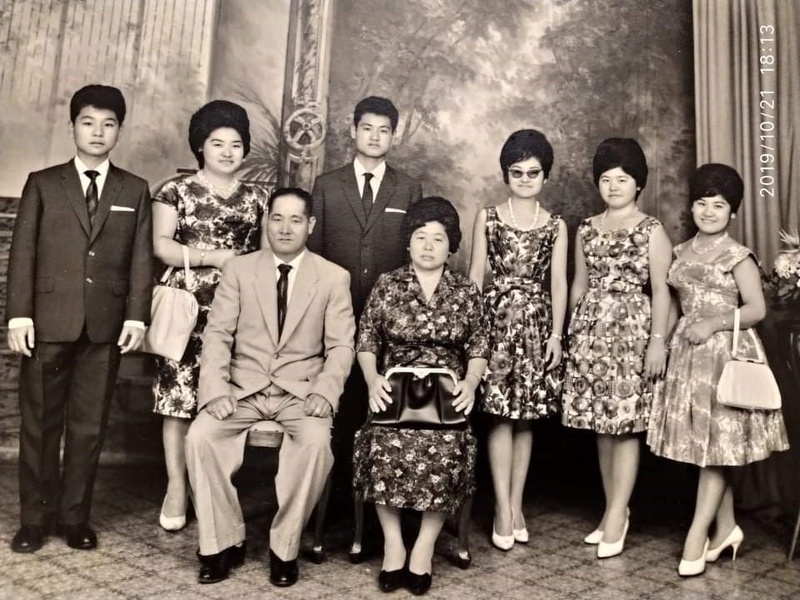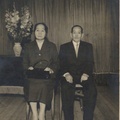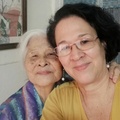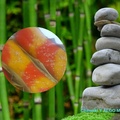I start this publication with what Isabel Kamiya told me, who wanted it for the title, but I had to cut it: “we inherit dignity, decency, honor, even property, but also illnesses from our parents. “We are very sweet brothers.”
This article has everything to prevent it from being read: common and simple people, strangers, the title is too long, as is the article (they say they should be short, concise, so that people do not abandon reading, especially an entry of a blog, with short and striking titles, but the truth is that I did not want to modify it, even if I ran the risk of not being read).
This is the story of the Kamiya Chinen family, a simple family like any other, but with such important experiences over time, with many joys, triumphs, sadness, just like any Nikkei family; many things in common. We are all important, we need recognition. If we remember our history, our past, our ancestors, we recognize them, they will always be alive in our hearts and in the hearts of others.
Katoku Kamiya, an ordinary person, like any boy from Okinawa, Japan, was born in 1908, the place was called Tamashiro. The economic situation at that time was very bad, the only solution for them was to emigrate, as most young people did, looking for a better future; A maternal uncle of his, who was in Peru, encouraged him to come to help him in the business he had. Katoku, when he was 19 years old, on May 3, 1927, arrived in Peru, he arrived alone and was received by his uncle, who had a warehouse on Abancay Avenue, in block 9, where he worked for ten years, after which decided to become independent.
For this, in Okinawa his father and a neighbor had agreed for him to marry Toyo Chinen, the daughter of this neighbor, they did it by means of power, that is how he arrived in Peru. Toyo, her neighbor, was 20 years old, she arrived in Lima already married, like Mrs. Kamiya, in 1937, knowing her husband only by sashín (photo), portrait in hand upon her arrival. As it was in those times, love would come later. Katoku received the winery from his uncle as payment for all those years and the uncle looked for another place, so they began their married life as a couple, owning the business. Katoku told Toyo that they would only stay ten years and then return.
Her daughter Isabel laughs and tells me: “my father tricked her, in ten years he made her six children, that way they would never return…”. Being in the center of Lima made them go to the cinemas, which apparently they both liked, in addition to other nearby entertainment places; Not everything was work, they even had an anecdote that they always told their children, they got to meet the Mexican Sara García in person, on one of her visits to Lima for a presentation.
Although it is true that they were times of war, thank God they did not have major problems, like some Nikkei , only once there was an altercation, but where the neighbors came to their defense. While in the winery, the couple's first four daughters were born: Julia Kazue was born on November 16, 1939, Rosa Hiroko was born on October 22, 1941, Dominga was born on March 21, 1943, and Isabel was born on September 27, 1943. 1944.
During that time they felt that they were not progressing, they told them that okane (money) was made faster in the farm business, so they ventured into it, that is how starting in 1945 they started on the poultry farm in Barranco. , on Luna Pizarro Street. From there they went, years later, to the third block of Jr. Progreso, a little further away. That's how they ventured, it was difficult to change the city for the countryside, go into a business they didn't know much about, they had to learn along the way.
On the farm they had chickens, hens, ducks, geese and they even had an incubator that had a capacity of ten thousand chicks. The business was a gold mine, but unfortunately nothing lasts forever, so they began to import double-breasted chickens, with it came the plague and the decline of the farms.
Although it is true that the children helped during summer vacations, father and mother were convinced that they should study so that each one could defend themselves in this life. Mom had turned out to be a very smart business person, totally dedicated to the farm and a visionary, cultured and intelligent person. She thought that her daughter Dominga should go to Spain to study Medicine.
Isabel tells me: “She had the ability to make me feel that dad was a trome 1 ”, I reflect on what she tells me and I think that Nikkei women have that ability to make us men believe that we can do anything, even though deep down they They are the driving forces behind everything we undertake. Their father spoiled them a lot, he corrected them, he spoiled them, especially the women. Their mother was more upright, certainly of more character, but her vision was that she had to make them economically independent, so that they would not have to go through hardships and women would not be supported or abused.
Mom didn't like to cook, cau cau wasn't a thing at all, at home they ate Creole for lunch and nihon ryori at night. Dad cooked and he did it very well, he also liked to shop, so at night there was no shortage of views of the countrymen, and behind the farm he had a garden where he grew vegetables like nasubi (eggplant), when there were turnips and leftovers. Pumpkins were dried to make senguiri .
At that time they took advantage of resources and time, so they also made katsuo or kachuu as we Uchinanchu know dried and smoked bonito fish. What mom liked to make was kamaboko (fish cake), castera (steam cake), for this she had managed to make a mold with long legs to place it in a large pot to make it with steam.
Dad was very happy, so meetings were held at home, he had two sanshin , he played and danced, he was very party-going. Mom, on the other hand, was different. Isabel remembers that one day her sister Dominga asked her why she married her father, who was the opposite of her, to which she intelligently answered: “compare your father with other fathers.” He describes Dad as a beautiful person, too generous, to the point of always fighting with his brother Santiago, who reproached him for lending okane to everyone, as if he were a millionaire.
His nesan Kazue and Rosa are the most serious, he tells me, “they are good nihonjin , I have to be very careful how I speak to them, the others have become accustomed to the Peruvian language, but with the training of nihonjin ”, which he attributes to the fact that they they only went to nihon gakko (Japanese school).
What brought them a lot of pride was that their father, in 1951, built a house with his money that was for Sensei Nagata, who was a multifaceted character, a pioneer of karate, judo, sumo and various martial arts, he was also a excellent watercolor painter. They built their house in the front part of the Chinen farm in Venegas, it was twelve blocks from their house, but there the sensei was going to teach them, as a nihon gakko . It seems that dad and mom still had the idea of sending their children to Japan or perhaps returning, when they did it it was just classes for them, but several sonjin families joined in: Chinen, Nakandakari, Nakamura, Oshiro, finally they were around. At times up to twenty students, perhaps staying for more than five years. When they were on the farm the two men were born, Santiago was born on April 17, 1946 and Julio was born on July 26, 1948.
When Isabel was ten years old they decided that they had to go to school, it was a great shock for her, the first day at a public school, close to home, to show up with an impeccable white apron, with her new suitcase, the one used by the collectors and of three bodies, he also carried his Minerva brand notebook bound and Mongol colored pencils. The teacher saw it in front of her and was shocked, then she would understand that it was a poor school and there they were, the farmers' children. That first impression apparently did not please the teacher. She had just entered a Peruvian school, so to speak, and they put her in second grade.
On his first day of school, they prayed and sang a religious song that he later learned was the Salve. The teacher, who had not had a good impression of her, reproached her because she did not even know what her right hand was, and she was mute. He took her to the blackboard to review addition and subtraction in decimals, he wrote a sum and placed a horizontal subtraction and below it a subtraction also in decimal.
Isabel tells me: “I got the ' samurai ' thing out of my head and I solved it like crazy and the teacher, very surprised, told me “your parents have to come because you can't be in second year.” The bad thing was that I was very good in mathematics, but in the other courses I was not so advanced, having been in a nihon gakko . His two older sisters only studied in nihongo , the last four were in a Peruvian school. There they were forced to make their first communion, so in a single day he was baptized, made his first communion and it was his first time in a church.
When he completed the fourth grade of primary school, he moved to the Great Juana Alarco de Dammert School Unit, on Benavides Avenue, where he continued until he finished high school. His sister Dominga entered the Fray Martín de Porres private school, she went to fourth grade. When she was evaluated, she was moved straight to fifth grade. She was very good in mathematics, but the other courses affected both of them. Her brothers studied at the Nicanor Rivera Cáceres public school, then at the José María Eguren, where they studied with Alan García, who often went to the farm to 'play', although Isabel comments: “Alan was a boy, but I think that more than playing "More like he came to eat, he was a big eater and they took good care of him at home."
Mom always had a dream, to return to Nihon , even if it was to visit, see her family. That's how they decided, dad wouldn't go, his entire family had died, many from the war, for him it didn't make sense to do it (or maybe he didn't want to face everything he had left in the past). It was January, oshogatsu (New Year) had passed, all that hustle and bustle, but mom was going on a trip. When mom traveled to Japan, her okasan (mom) and brothers were still alive, she was very excited to see them, all the preparations, they even took a family photo, they went to Asahi, she was going to show everyone how proud she was to her family, the grandparents had to see their grandchildren, even if it was through photos she would know them, carrying gifts, the omiyague (presents), but the truth is that she returned very sad, she no longer found her friends from when she was a child, her brothers were already very old, I felt that there was a distance between them, that time had made it so great, for all those years that they were distanced from end to end in the world; It was no wonder, 27 years had passed.
Back in the month of May, mom quickly returned to her activities, she had to deal with things related to Dominga's trip, she was going to Spain to study medicine, she was a minor and had to apply for a permit before the judge. He left in August. Until December 13th arrived, at 7 pm. Everyone was at home, mom felt bad, everyone was amazed, scared, not knowing what to do in these situations. The Casimiro Ulloa Hospital was 10 minutes away, mother died in the arms of Julia Kazue, she did not arrive for assistance, cardiac arrest was devastating. Dad was 54 years old when Mom died, but in one year he aged as if ten years had passed. Her mother died at the age of 46, she had diabetes, unfortunately everyone has inherited this disease, except Isabel, but it is worth taking care of yourself. “We inherit from our parents dignity, decency, honor, even property, but also illnesses, we are very sweet brothers... Their father was very curly, so everyone is..., my brother has clubbing hair and he is 1.80, he was born with more than 5 kilos due to his mother's diabetes, my Nesan was 1.65, he also weighed more than 5 kilos, they were by cesarean section, rather I am small."
After her mother died, Rosa went to Spain to accompany Dominga, she stayed for a year, where she studied Haute Couture, here she had already taken cutting and sewing courses, and then moved to New York. Isabel tells me: “Today when I reflect, I tell myself all this happened in the same year and it seems incredible to me.”
Julia Kazue, “my nesan ” as Isabel always says when referring to her, was the eldest daughter, she had to take charge when her mother died. The fact that he died in her arms reaffirmed that, she was 24 years old, although it is true that they were all grown up, she assumed the leadership of the house. She studied cooking and baking, as well as sewing, she was always told to make wedding cakes. Kazue never married, surely her father wanted an okanemochi suitor, says Isabel, he scared them all away, he considered her his princess, she even remembers that when she turned 12, at her umaredoshi , he threw the house out of the window, inviting many people. Surely everyone from the sonjin was there, only she was made a saint, she tells me, but probably because she was the oldest. She passed away on March 1, 2020.
Rosa Hiroko studied haute couture, she accompanied Dominga for almost a year in Spain, until she came of age, at that time she was 21 years old. Then she went to New York, where she continued her career, she is currently retired, she is professing a Hindu religion, for this she goes often to India, while Dominga finished her medical studies in Spain, has a daughter and a grandson, currently lives in Valencia. Rosa and Dominga returned to visit many times, but both made their lives abroad.
Isabel finished her high school studies in 1963, just when her mother died. He studied a technical degree in photography, his father helped him start a photography studio, making him financially independent. He dedicated himself to it for 40 years. At the age of 25 she already had her own business, always grateful to dad, because he made her independent and helped her. It is currently retired (I will write about it in a next article).
Santiago studied Food Industry at the University of La Molina, worked on several poultry farms as a commercial poultry feed supervisor, and has a son and a granddaughter. Julio studied Animal Science at the University of La Molina, worked in government entities, in charge of the ninth agricultural zone, also in ENATA. Julio graduated from ESAN, has a daughter and had a son who was the oldest, unfortunately he died when he was 35 years old, he had two professions and was single.
In 1956 they had managed to buy the land where the farm was, but when Mom died, things were never the same. Dad was very sad, mom was the driving force of the farm, people approached him saying why they had so much land, then they discovered that they were envious, several approached who had nothing, many took advantage of him, they even scammed him, unfortunately The one who did it the most was a Nikkei, he placed his trust in him, but he let him down. In 1968, when the developer came, they sold a large part of the land, keeping a small lot, where the house was. It must be taken into account that the farm was one block long and when houses were built, it could no longer function; at that time, the children did not depend on him.
During several hours of chat, on several days in which I interviewed Isabel Kamiya, she told me her family history, that is why I write this article as a narration of all the facts, as a privileged spectator, in this way I hope that you reading it you feel at times sadness and joy that I felt when becoming a participant in the story of the Kamiya Chinen family. I'm sure that Isabel at times must have felt overwhelmed by the number of questions I asked her, as soon as she finished answering, she began with the reply. Personally, I think it was worth it, especially to learn a little about his family, his history. Throughout the story, I use quotation marks to indicate those thoughts that Isabel gave me and that moved me, caught my attention, sadness, joy, that marked me when I received her story.
Note:
1. Peruvian slang meaning skillful, ingenious.
Roberto Oshiro Teruya






